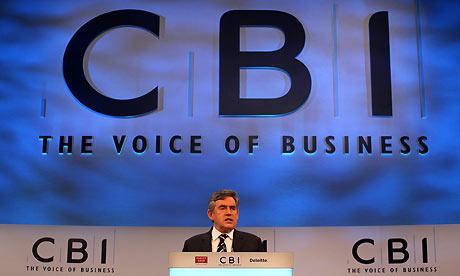Brown and Cameron clash over budget deficit
PM warns Britain should be careful not to withdraw its support for the economy too soon as the Tory leader presses for immediate action over the ballooning budget deficit
Prime minister Gordon Brown and Conservative leader David Cameron today clashed over the best way to tackle Britain's biggest budget deficit since the second world war.
Speaking at the Confederation for British Industry's annual conference in London, Brown said that turning off the life support measures, implemented in the midst of the financial crisis, too soon could damage any hopes of recovery.

Gordon Brown told the CBI the public needed 'certainty'. Photograph: Oli Scarff/Getty Images
"Choking off recovery by turning off the life support for our economies prematurely would be fatal to British jobs, British growth and British prosperity for years.
"People need certainty. They need to know if there's a stable path of deficit reduction they can see will take place. We've also announced the measures we have to take in taxation and spending to get to that figure. This is not an aspiration, it is not even a legal commitment alone. It is a set of measures we are prepared to take. Once the recession is over and private business recovery is fully established, we can withdraw the stimulus."
But Cameron rejected Brown's arguments, insisting that the budget deficit must be reduced much sooner. "Dealing with this deficit is not an alternative to economic growth – the two go hand in hand. If investors see that there is no will at the top of government to get a grip on our public finances, they are going to seriously doubt our country's creditworthiness."
The idea that dealing promptly with the fiscal deficit would damage the recovery was "profoundly wrong", said Cameron.
He also announced today that if the Conservatives win the forthcoming general election then they would introduce an emergency budget within 50 days of coming to power.
Britain's public coffers are expected to see a deficit of £175bn in 2009/10, with some economists even predicting that it will peak at £190bn.
Dominique Strauss-Kahn, managing director of the International Monetary Fund, appeared to side with Brown rather than Cameron. Also speaking at the conference, he said that the global economy is still in a "highly fragile" state following the financial crisis, and could face further turmoil in the months ahead.
"Today the storm has passed. The worst has been averted. And yet the economy remains very much in a holding pattern – stable, and getting better, but still highly vulnerable. [For policymakers] the challenges are great. During the crisis, everyone was united by a common purpose. Going forward, this might dissolve. So the road ahead will be less clear cut. We will need some deft maneuvering, and perhaps some out-of-the-box thinking. We will need continued collaboration."
Brown said that was now vital for the UK to attract inward investment, especially from China. "More than 400 Chinese companies have come to Britain. In our new growth strategy I want not just hundreds but thousands of Chinese companies in Britain, and British companies in China," he said.
He also said that it is important not to take Europe for granted. "We must never forget that Europe accounts for 60% of our trade … more than 3 million British jobs depend on Europe.
"It is by putting Britain not on the fringes of Europe – but at its heart – that Britain can protect its interests within Europe and shape the future of Europe from a position of strength that delivers growth and jobs for the British people … to walk away from this would be to deal a devastating blow to the future prospects of British business – and it's my belief that we must never allow this to happen."

No comments:
Post a Comment